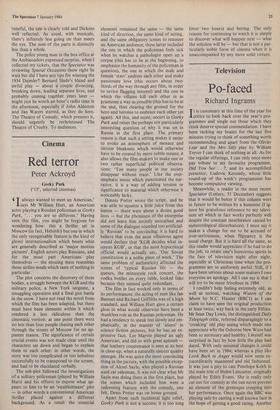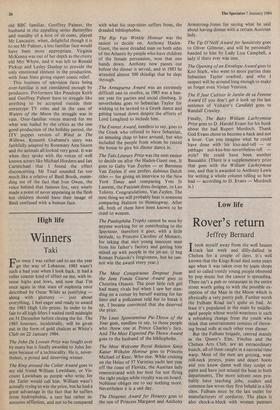Television
Po-faced
Richard Ingrams
It is customary at this time of the year for critics to look back over the year's pro- grammes and single out those which they think deserve special commendation. I have been racking my brains for the last five minutes trying to think of something worth recommending and apart from the Olivier Lear and the Mrs Silly play by William Trevor I can think of nothing at all. As for the regular offerings, I can only once more pay tribute to my favourite programme, Did You See . . ?, and its accomplished presenter, Ludovic Kennedy, whose little round-up of the week's programmes has become compulsive viewing.
Meanwhile, a reader in the most recent Spectator (Letters, 31 December) suggests that it would be better if this column were in future to be written by a humorist (I ig- nore his gratuitous reference to my televi- sion set which in fact works perfectly well despite the constant interference caused by meteorological disturbances). I must say it makes a change for me to be accused of over-seriousness, when flippancy is the usual charge. But it is hard all the same, as this reader would appreciate if he had to do the job, to retain one's humorous spirits in the face of television night after night, especially at Christmas time when the pro- grammes are so uniformly awful. Still, if I have been serious about some matters I owe everyone an apology. All I can say is that I will try to be more frivolous in 1984.
I couldn't help feeling extremely old, as well as serious, watching Waters of the Moon by N.C. Hunter (BBC1) as 1 can claim to have seen the original production at least twice, way back in the early Fifties. Mr Sean Day Lewis, the distinguished Daily Telegraph critic, referred disparagingly to a `creaking' old play seeing which made one appreciate why the Osborne New Wave had been so necessary and healthy. I myself was surprised in fact by how little the play had dated. With only minimal changes it could have been set in 1984; whereas a play like Look Back in Anger would now seem ex- traordinarily mannered and old fashioned. It was just a pity to cast Penelope Keith in the main role of Helen Lancaster, originally played by Edith Evans. She is really only cut out for comedy as she can never prevent an element of the grotesque creeping into her performance. Once again the BBC was playing safe by casting a well known face in the hope of getting a good rating. Another
old BBC familiar, Geoffrey Palmer, the husband in the appalling series Butterflies and standby of a host of sit-corns, played Mr Lancaster, when, delightful though it is to see Mr Palmer, a less familiar face would have been more appropriate. Virginia McKenna was out of her depth as the crusty old Mrs Whyte, and it was left to Ronald Pickup and Lesley Dunlop to provide the only emotional element in the production, with Joan Sims giving expert comic relief.
This business of television faces being over-familiar is not considered enough by producers. Performers like Penelope Keith and Geoffrey Palmer have to struggle like anything to be accepted outside their stereotype TV roles and in the case of Waters of the Moon the struggle was in vain. Over-familiar voices marred for me what was hailed by the critics as the one good production of the holiday period, the ITV puppet version of Wind in The Willows. Kenneth Grahame's story was faithfully adapted by Rosemary Ann Sisson and the animals all looked very good. It was when they spoke with the voices of well known actors like Michael Hordern and Ian Carmichael that I found the effect disconcerting. Mr Toad sounded far too much like a relative of Basil Brush, remin- ding me of the fact that Ivor Owen, the voice behind that famous fox, very wisely made a point of never appearing in the flesh lest children should have their image of Basil confused with a human face.



































 Previous page
Previous page